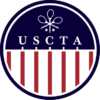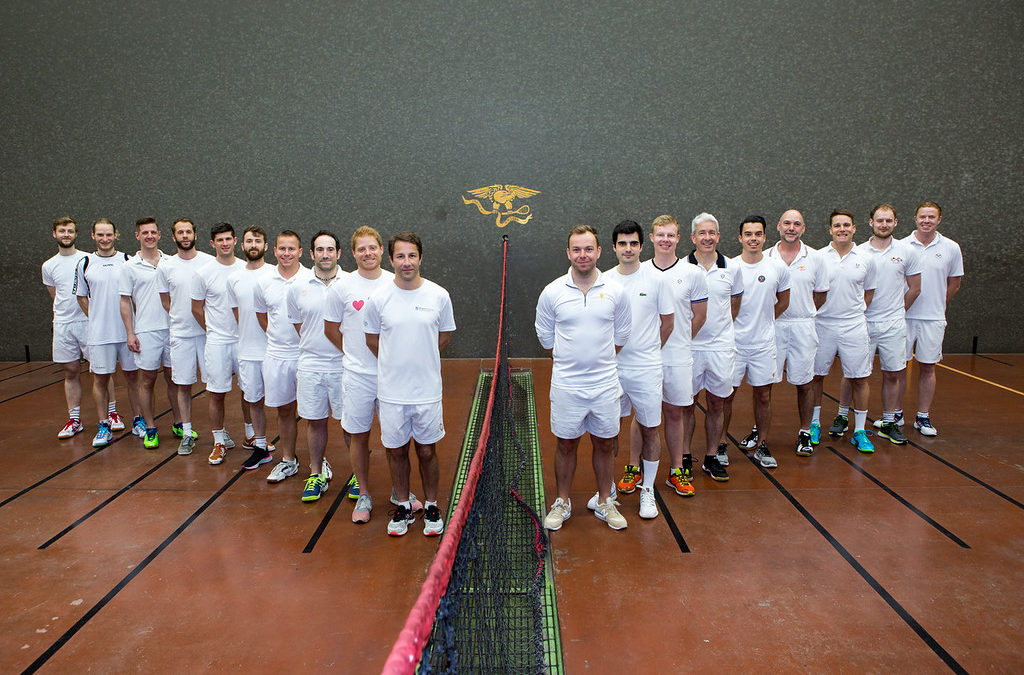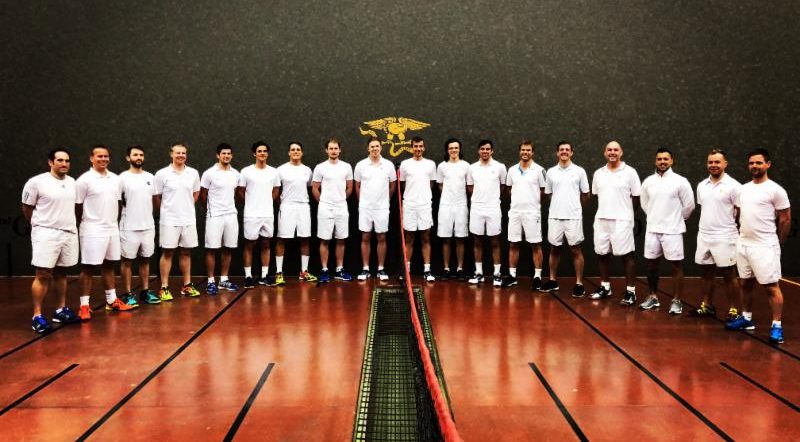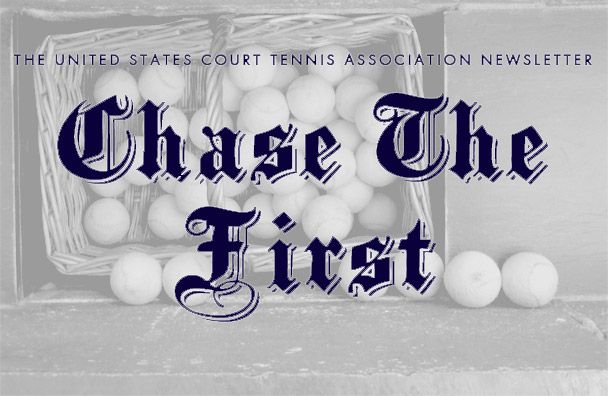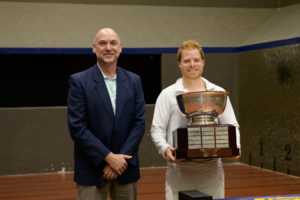 “Ecstatic to have won my 10th CONSECUTIVE US Professional Singles title! Never imagined it would get to this point, but honored to be here holding the trophy today after an epic final! Time for some RandR!” Camden Riviere
“Ecstatic to have won my 10th CONSECUTIVE US Professional Singles title! Never imagined it would get to this point, but honored to be here holding the trophy today after an epic final! Time for some RandR!” Camden Riviere
by Trevor Jones
The 2019 U.S. Pro Singles Playing for the Schochet Cup in Newport saw a solid field again this year, eight out of the top ten players took the court at the National Tennis Club at the International Tennis Hall of Fame. High-level tennis filled the Main Draw and overflowed into the Satellite Draw played this year in memory of Ged Eden. As well, there was an entertaining Pro-Am round-robin event.
Coming to Newport, Camden Riviere looked to stake his claim as champion once again. To do so, the American had to advance through a tricky section that included NTC at ITHF head pro, Mike Gooding, followed by World #3, Chris Chapman. As so often is the case, Riviere met defending World Champion, Rob Fahey in the final. Fahey, too, was put to the test leading up to his match with World #1, but surely the level of tennis in the final was unparalleled. Fahey used his renowned hard-hitting, target-sniping style to push Riviere all over the court, but the South Carolinian’s feet were too quick and hands too soft; after racing to a 5-1 lead in the first, Fahey was able to secure a game from the serving side. However, despite moving Riviere from side to side, the Member of the British Empire could not make too much of a dent and conceded the set 6-2. The second set flip-flopped: this time, it was Fahey who raced to a lead.
At a commanding 4-1, Riviere was able to dig a deep ball out of the backcourt, then sprint up to the galleries and connect with an excellent volley to make it 2-4. Looking like he might have some momentum going his way, he was able to serve until 40-30 in the coveted seventh game before swapping ends for a chase. Despite defending the second-gallery chase, Fahey could not close out the game, and Riviere inched closer, making it 3-4. Looking like the momentum was on his side, the touring pro stayed on the receiving side for much of the game as the momentum slowly slipped back the way of Fahey who took a 40-15 lead at the changeover. Riviere was able to defend a hazard-chase, drawing an error out of Fahey, and then leveling the game at deuce. Hoping to even the score, the lefty served up his trademark railroad in hopes of taking the offensive immediately. The Australian, however, had other ideas in mind, using a main-wall boast to take charge of the point, ending it with uncharacteristic touch. After an error from the American in the final point, Fahey firmly established his lead again, making it 5-3. He continued his dominant play, riding out the set 6-3, to even out the set score at one-a-piece. The third see-sawed back and forth, with momentum shifts being traded between the athletes. Serving at 5-4, Riviere hoped to close it out in clean fashion, and it looked like Fahey was starting to show signs of his age when, after a break to catch his breath, he missed a return into the net. At 30-15 to World #1, the World Champion had a remaining hope in the form of two chases. After switching sides, he was not able to land the first serve, forcing him to hit a weaker second which bounced off the back penthouse. Riviere capitalized on the opportunity and hit a boast into the dedans to win the chase and the point. Fahey remained collected and staved off the next chase, but Riviere still had a 40-30 lead; if he could win the next point, he would take two sets to one advantage. And he was able to do just that, pounding the ball up the middle and then side to side, making Fahey play continuous defense, taking it 6-4. Playing now with a solid lead under his belt, Riviere again ran to 3-1 lead before the Hobart native hit a pair of forces to draw errors out of the South Carolinian and creep back to 2-3. After that, however, it was all Riviere’s game. Fahey had a chance at 2-4 when the advantage was in his favor. He threw the kitchen sink at the 32-year-old but could not put the final nail in the coffin and missed a tambour shot into the net. From there, it was lights-out from Riviere who, after trading ends a couple times, won the game from the receiving end from a volley-error by Fahey. He went up to a quick 40-15 lead before a penultimate changing of sides on a hazard chase. Fahey put the ball behind Riviere, winning the chase, to make things more interesting at 30-40, but the quinquagenarian’s luck stopped there as, after he hit a chase second gallery, the American forced an error by knocking one near the last gallery. From the receiving end, a fist pumped, and a wave went out to the crowd — Riviere had sealed the victory on an unprecedented tenth consecutive US Pro Singles victory and, with it, raised the familiar Schochet Cup by a score line of 6-2, 3-6, 6-4, 6-2. The next closest player in terms of victories of the tournament had been standing on the other side of the net for the match: Fahey had won it eight times, seven of which consecutively, between 2003-2009. The match, which Riviere himself recognized as being “epic”, was just that. A showdown between two of the all-time greats was indeed a battle of momentum shifts that, in the end, was won by the better player of the day.
The Satellite Draw was played in memory of Ged Eden. Ged was a professional who was passionate about the game of real tennis and growing its influence; he was widely considered a top club professional who knew all of the ins-and-outs of the sport, working at clubs in England, Australia, France, as well as a number throughout the US. Tragically, Ged passed away this year, so the tournament was named in his memory. Showcasing a great deal of high-quality tennis between up-and-comers and longtime veterans, the Satellite Draw turned out to exemplify that youth vs. experience sentiment perfectly. In the final were Mike Gooding and Boston Tennis and Racquet assistant pro, Leon Smart. Gooding dazzled the home crowd, rolling back the years and seemingly shrinking the nearly 30-year age gap between the two players, but Smart’s steady play and young legs proved too much for the Scotsman. Despite a late second-set comeback after being down 1-5, Gooding could not convert, and Smart took the draw 6-4, 6-3. Also, on the day was the Pro-Am tournament, which was played in a round robin, ten game pro-set format. Reaching the final was NTC member James Chamberlain and Wellington College senior professional Adam Player who battled out Doug Shear and Queens Club assistant pro Simon Marshall. Shear and Marshall proved to have great chemistry but could not come up with the goods when they needed to, falling to Chamberlain and Player 10-4 in a fun-filled final.
The annual event was very much a great success and was made possible by a coalition of supporters. Firstly, we must thank Suzette Schochet and her family, the namesake of the trophy, and their continued support of the tournament. Also, Northfield Information Services for their generous continued support of the tournament. The International Tennis Hall of Fame were great hosts again, and nothing would be possible without the help of the United States Court Tennis Association and the United States Court Tennis Preservation Foundation. As well, David and Pamela Ford generously opened up their home, Miramar, for a beautiful evening. Finally, it is essential to recognize all of the sponsors, hosts, and volunteers who helped ensure the success of this event. Without any of these people or organizations, none of this would be possible. Thank you all for your generous support of this tournament and the great game of court tennis. We very much look forward to the 2020 Pro Singles!
Please click here for the draws, tournament program, and streaming links
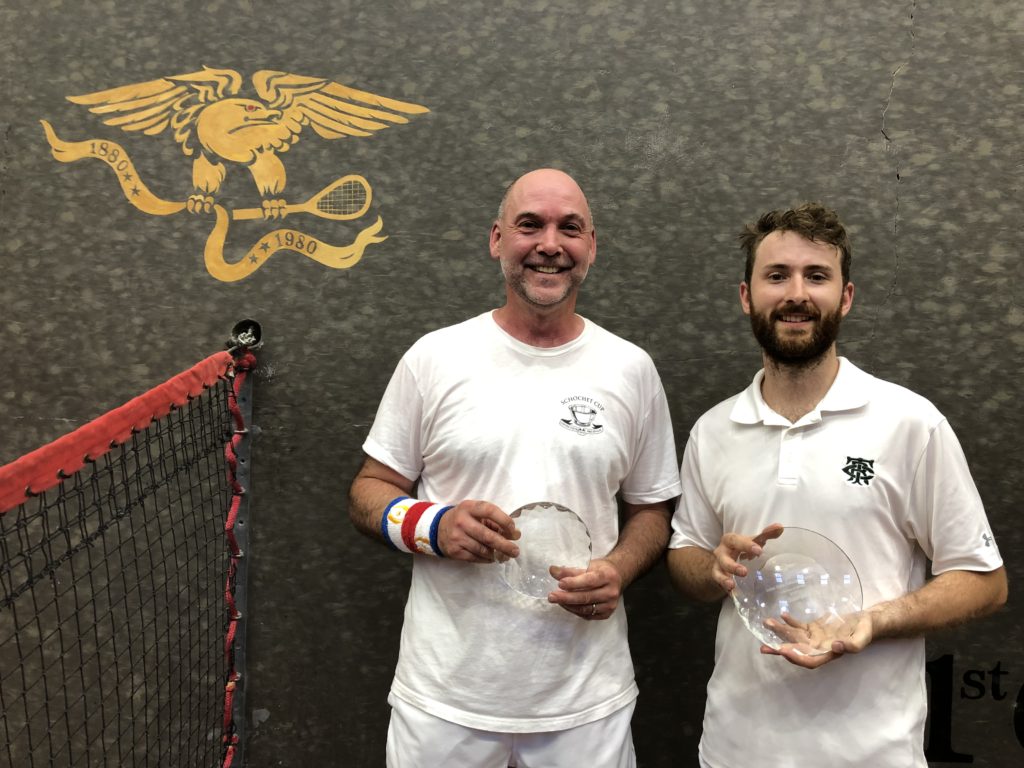
Mike Gooding (finalist) and Leon Smart – Winner – 2019 Satellite – U.S. Pro Singles
